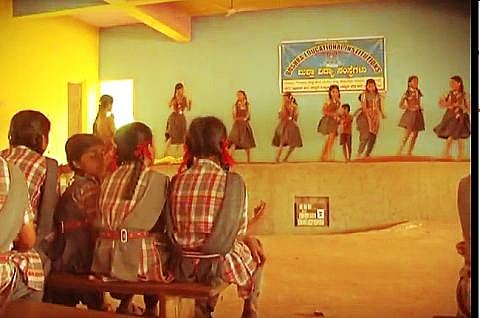

“Navu Muslims alla? Navu dance madlike baradu..Arabic maastru baithare” (Aren’t we Muslims? We are not allowed to dance. The Arabic teacher will scold us)
In the deafening noise around the ‘big things that matter’, little yet important aspects of social life go unnoticed and unchecked. Little things like dancing children.
It is not a sign of good health when an innocuous, joyful act like a 10-year-old’s choice to dance on stage becomes an attack on culture. Journalist Irshad Uppinangady’s documentary Swargada Haadiyalli Kamarutiruva Kanasugalu (Shattered Dreams on the Path to Heaven) takes us into the worlds of 8-12 year-old Muslim girls in the villages of Dakshina Kannada district in coastal Karnataka, who have been admonished by Madrasa teachers for dancing on stage.
The standard response when they were asked why they don’t participate in school day competitions that involve dancing on stage, every girl interviewed in the film says this – The madarasa teacher will scold us. Aren’t we Muslims? We are not allowed to dance. The Arabic teacher will scold us.
Several of them also say, in barely audible whispers, that they wished to dance.
Religious leaders are seen claiming that Islamic tenets forbid women from dancing on stage “when they become big” (read puberty) as it is “vulgar”.
The parents, however, who appear to be afraid of and worried about taking on religious heads, hesitantly impose the diktat on their kids, who through their shy smiles and whispers, indicate that they would love to join their classmates as they dance unselfconsciously.
In 25 minutes, the documentary deals with an embattled community with great sensitivity, letting the children speak for themselves and also presenting the views of Muslims who speak out against such arbitrary imposition.
Growing up seeing this happen compelled him to make the documentary, Irshad told The News Minute. “I’ve seen this happen as a child. Boys would be allowed to do what they wished. Even when they were restrictions, they could always choose to ignore them. I felt bad that restrictions were being imposed on little girls in the name of religion,” the 28-year-old says.
He says that education for Muslims girls in coastal Karnataka came much later than it did for girls from other communities. “But where education generally brings about greater freedom, it did not happen with us. Instead, we are regressing,” Irshad says.
One of the reasons for this regression is that the Muslims of coastal Karnataka are increasingly becoming influenced by the Wahabi Islam on account of a large number of Muslims from the region migrating to West Asian countries for work.
The second reason, he says: “The attacks on the Muslim community are being used to promote a particular kind of Islam. Before that, there was backwardness, but we never accepted fundamentalism. This notion of a ‘pure Islam’ began to creep in around 10 years ago, that only this or that is the ‘right way’ to practice Islam. Does that mean that the Sufi-influenced Islam that we practiced until recently is wrong?”
Earlier, writers such as Bolwar Mohammed Kunhi and others did and could take on fundamentalism unhesitatingly, but it has increasingly become difficult for anyone now, to take on religious leaders because of socio-political factors beyond their control, Irshad says.
Asked if there were any religious leaders who would stand up for the little girls who wished to dance, Irshad says that he had spoken to religious leaders belonging to different denominations of Islam practiced in the region – Sunni, Salafi, Jamaat-e-Islami Hind – but it was unlikely that any of them would do it.
“But there are progressive voices within the community like (social acitivist and Congress member) Zohra Nisar Ahmed, (DYFI state president) Muneer Katipalla and (writer) Sara Abubakar, who believe that children should not be restricted in such ways.”
So far, the documentary has only been screened once, during a Press Day celebration in Bengaluru on July 25. It’s only presence in the public domain, is a 30-second trailer of the film on YouTube. However, Irshad is planning to screen in Mangaluru later this month.
Asked if he was worried about backlash from the community given its criticism of religious leaders, Irshad says that a couple of people of his acquaintance had called him to say that he should not have made the film, but there was nothing beyond that.
“Naturally when you take on the community, the likelihood of threats is always there, but I don’t know if that will happen.”
As far as he is concerned, he just has one thing to say: “Im not against Islam, but all these religious pundits say its vulgar for girls to dance on stage. Dancing is both education and expression. If you think that its vulgar, then it’s your perception that’s vulgar.”